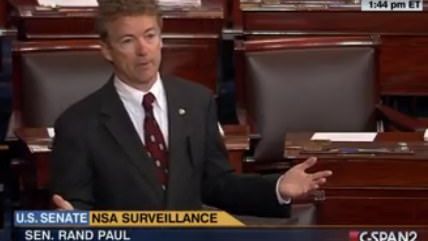Sen. Rand Paul Continues Beating the Drum About the Privacy of Our Metadata
Dissenting justices understood the possible consequences, even back in the 1970s.


As an anecdotal observation from covering the final push to pass the USA Freedom Act, a considerable number of libertarians (or at least Reason followers) took Sen. Rand Paul's side in the debate. A significant number of you did not want to settle for the compromise represented by the Freedom Act and support Paul for holding out and voting no.
It's understandable, given how little we should trust the National Security Agency (NSA) and our own intelligence leaders given the number of lies and half-truths they've told us about what they're doing. And to be clear, despite describing the Freedom Act as a win when it passed, I also don't think Paul is wrong, either tactically or philosophically, to have voted no. We can't even say with certainty that anything will get better until we start seeing the declassification of future Foreign Intelligence Surveillance (FISA) Court rulings years down the line.
But while some politicians may be satisfied to conclude that the surveillance problem has been "solved" now and wash their hands of the whole thing, Paul is not moving on. He has a commentary over at Time this week hitting back at the argument that third-party records aren't protected or private information. Supporters of the security state during the debate were quick to call on this Supreme Court decision from 1979 to buttress their arguments. In Smith v. Maryland, the Supreme Court ruled that records held by the phone company were not personal or private because they were in the hands of a third party and therefore not protected by the Fourth Amendment. In his commentary, Paul takes note of what the dissenters in that court ruling had to say:
The justices who dissented in Smith v. Maryland, though, were amazingly prescient and on target. Justice Thurgood Marshall—who disagreed with the opinion of the court—wrote that he didn't share the assumption that customers would "typically know" that a phone company tracked calls internally—and that even if they did, there's no way individuals would expect the general public or government to be privy to such records.
Privacy, Justice Marshall argued, is not a "discrete commodity, possessed absolutely or not at all." Citizens who disclose information to a bank or a phone company with a specific intention for business, Marshall maintained, have a reasonable expectation that this information will not be released to outside entities.
Justices Potter Stewart and William J. Brennan also expressed their belief that phone records deserved protection, writing in their dissent that they were "not persuaded that the numbers dialed from a private telephone fall outside the constitutional protection of the Fourth and Fourteenth Amendments."
Stewart and Brennan maintained that a private citizen at home has an assumption of privacy regarding whom he or she contacts, and a constitutional right to privacy. "The numbers dialed from a private telephone—like the conversations that occur during a call—are within the constitutional protection," Stewart and Brennan wrote. "The information captured by such surveillance emanates from private conduct within a person's home or office—locations that without question are entitled to Fourth and Fourteenth Amendment protection."
The numbers dialed are "not without 'content,'" they argued—and despite that phone books are in the public domain, most customers would not want their call log revealed to the world. "This is not because such a list might in some sense be incriminating, but because it easily could reveal the identities of the persons and the places called, and thus reveal the most intimate details of a person's life," they argued.
Prescient, indeed. Since the public discovery that the NSA has been collecting all sorts of metadata about Americans there have been a number of experiments that showed that those justices were exactly right: You can learn a lot about a person from just his or her metadata. I mean, obviously this was the case; it's a little silly this is even an argument. If the government couldn't learn a lot from people's metadata, they wouldn't be fighting so hard to keep the authority to collect it.
Read Paul's full commentary here. The next item on the agenda for privacy politicians is stopping the government from demanding that companies or products provide "back doors" to allow the FBI or other agencies to bypass its encryption and to prohibit funding for the government to undermine encryption. The House, pushed by folks like Rep. Thomas Massie (R-Ky.), one of Paul's sidekicks during the Freedom Act debates, and Rep. Ted Poe (R-Texas) has this week approved amendments in these areas. Read more about them here.
Editor's Note: As of February 29, 2024, commenting privileges on reason.com posts are limited to Reason Plus subscribers. Past commenters are grandfathered in for a temporary period. Subscribe here to preserve your ability to comment. Your Reason Plus subscription also gives you an ad-free version of reason.com, along with full access to the digital edition and archives of Reason magazine. We request that comments be civil and on-topic. We do not moderate or assume any responsibility for comments, which are owned by the readers who post them. Comments do not represent the views of reason.com or Reason Foundation. We reserve the right to delete any comment and ban commenters for any reason at any time. Comments may only be edited within 5 minutes of posting. Report abuses.
Please to post comments


We can't even say with certainty that anything will get better until we start seeing the declassification of future Foreign Intelligence Surveillance (FISA) Court rulings years down the line.
Oh, pish posh. Aggressive congressional oversight will tell us whether the USAFREEDOM Act is crushing it or if it's a capital L loser. (I know which my money is on.)
It's obviously going to crush our national security, leading to the doom of us all! THE DOOM OF US ALL!
The terrorists have already won, for fuck's sake. YOU BASTARDS!
*shakes fist*
Are you being sarcastic or cynical? Because you're actually right in many ways.
It's disturbing that OBL's predictions of what America would stupidly do in reaction to the 9/11 attacks have actually come to pass. Indeed, he UNDER-predicted America's vast reservoir stupidity. But, hey, he was just a fucking terrorist so why do his views matter?
Of course he under-predicted it. One of the flaws of the terrorists is that they don't realize just how large, vast and powerful this country and its federal government is. They thought that blowing up the Trade Center would 'rain fire down on America'.
The "compromise" was total BS.
Unexpired provisions of the Patriot Act arguably may allow the government to continue acting as it pleases, especially considering the FISA Court rubber-stamps ~99% of NSA's interpretations of the law.
On top of that, the Freedom Act actually authorizes metadata collection, which makes it worse than the Patriot Act. The fact that the collection will be done by the telecoms (under threat of sanctions, so as agents of the government) rather than the government is not in any way a victory for privacy. Once the NSA obtains broad authorization from FISA Court to make whatever demands it wants on the telecoms (which I'm sure they're working on this very minute), essentially nothing will have changed.
Why do you hate America, bassjoe? Why?
We need this act passed, as it was, FOR THE CHILDREN!! FOR. THE. CHILDREN.
It's that important.
U-S-A! U-S-A! U-S-A!
Oh, on top of that, the Freedom Act actually gave the NSA six damn months to shut down the metadata collection program. Anybody want to take a bit that an "emergency" extension will be passed right before Congress's Thanksgiving recess?
Well, outsourcing the metadata collection is obviously the solution.
Jeebus. Fucked we are. The only question, I believe, is exactly how we will make the final descent into an overtly authoritarian craphole.
I'll only trust that our freedoms are actually restored when Congress passes the Burning the Fourth Amendment Act. Is there such a thing as anti-Orwellian?
It would be an interesting exercise to redraft the BOR to reflect all the holes that have punched into it and the sub rosa amendments that have made to it by SCOTUS.
Put that up for a vote: The Restated Bill of Rights. Not amended, just restated to reflect the current status quo.
It would be horrifying. But maybe educational, too.
This metadata concept isn't even something that needs to be debated.
Even the NSA knows that Metadata can give all kinds of things away about you. Remember how the NSA wouldn't disclose its water bill because someone might be able to glean the size of their data center from it?
Aand to be clear
Um...
You must be a blast at parties.
"We can't even say with certainty that anything will get better until we start seeing the declassification of future Foreign Intelligence Surveillance (FISA) Court rulings years down the line."
No, we'll have to wait for Snowden 2.0 to reveal how the NSA has been violating the law.
To those (like a good friend of mine) who say there's no privacy issue at all, I'd say require phone companies to put its customers' call records on their Web sites so that any member of the public can access them.
Oh, you mean there's a privacy issue if the general public has access, but there's no problem if bureaucrats get to paw through it at will?
She is not a moderate. She is an amoral crap weasel that will say and do anything to continue to suckle on the body public. then check all report news this way.... http://moourl.com/gjftp